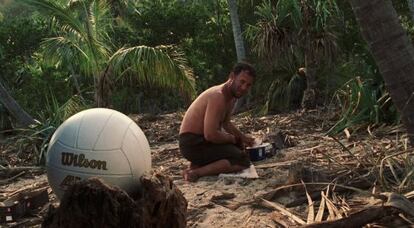It all adds up
The film industry is finding new ways of financing itself


Cinema and advertising are, and have always been, natural bedfellows. In ways more or less eloquent, in forms more or less shameless, the incursions of the latter – the art of persuading you to buy products – into the former – the art of telling stories with images - have for decades been serving as the basis for a mutual benefit often undeclared but always fruitful when it comes to talking about the numbers rather than the story.
New formats and techniques have recently marked this crossing of paths. One of these are so-called "dramanagement movies," narrative films paid for by a company that sometimes isn't even mentioned in the finished product. The Cannes Film Festival earlier this year included a gala screening of A Therapy, a short movie made by Roman Polanski for fashion label Prada: it put up the cash and gave the director complete creative freedom. Back in 2007 cava wine producer Freixenet did something similar in Spain when it turned its traditional Christmas commercial into a thriller called The Key to Reserva, directed by Martin Scorsese.
Barcelona-based company Cookie Box has been developing films like these for the last four years. "At a time when businesses are disliked, brands need to go further," says Sergi Corbeto, one of the four partners in the firm, which counts Santander, Endesa, Gallina Blanca and La Caixa among its clients. "We promote the values of our clients, whether externally, in films for the whole world, or internally, in short films for their customers or employees."
The new formats benefit both brands and film financing, he says. "We have created around 35 films - the longest is 18 minutes - with an average budget of 50,000 euros. They can be metaphorical, direct, fictional, documentaries. What you will never see is the brand being shoved down the viewer's throat."
At a time when nothing is certain regarding financing -- and nowhere more so than in the world of film and television -- new possibilities for 21st-century audiovisual production are naturally being explored. And there is no lack of distinguished examples. It seems incredible that a filmmaker such as Woody Allen, an icon of independence and a classic comedian, has ended up in the vanguard of film advertising and marketing. Not only do his films feature product placement – when particular products appear in a movie or TV series, such as when the characters in Allen's 2009 flick Whatever Works are clearly seen drinking a certain brand of Spanish lager in the final Christmas party scene -- but he has also gone further and entered into the world of branded content, where brands are integrated into the very plot of the film itself.
And that's where Allen has been brilliant: his recent Europe-set movies are sponsored by the public organizations of the cities in which they are filmed. "Barcelona will never be able to pay for what it means to be mentioned in Vicky Cristina Barcelona," says Marcos Campos, who has worked in advertising and communications for 14 years. "Not only is the city fundamental to the plot, but the name appears in the title. A product is not just the content, but also everything that surrounds it. That's what I work on."
Campos has spent the past five years developing branded content in Spanish cinema. "I'm very proud of the work I did on, for example, [Bigas Luna's film] Yo soy la Juani, which has up to 16 brands inserted into the story, or [Alex de la Iglesia's] La chispa de la vida: if there is a character who is a security guard, why not have him belong to a real company in the sector? I associate a brand that wants a critical mass of clients with a producer looking for money."
It may be in fashion, but only one in every 100 advertisers opt to dip their toe into branded content. Is Spanish cinema open to this new form of advertising? "Yes, and you notice it, but you have to be clear: as long as it is art, it works," says Campos. "You have to work, so that it is wonderful for both parties. If not, the public will reject it. Well developed, from the script and hand-in-hand with the producer, it could mean an income of up to a third of the budget of a film."
At a time of economic crisis, that sounds like a bargain impossible to resist.
Tu suscripción se está usando en otro dispositivo
¿Quieres añadir otro usuario a tu suscripción?
Si continúas leyendo en este dispositivo, no se podrá leer en el otro.
FlechaTu suscripción se está usando en otro dispositivo y solo puedes acceder a EL PAÍS desde un dispositivo a la vez.
Si quieres compartir tu cuenta, cambia tu suscripción a la modalidad Premium, así podrás añadir otro usuario. Cada uno accederá con su propia cuenta de email, lo que os permitirá personalizar vuestra experiencia en EL PAÍS.
¿Tienes una suscripción de empresa? Accede aquí para contratar más cuentas.
En el caso de no saber quién está usando tu cuenta, te recomendamos cambiar tu contraseña aquí.
Si decides continuar compartiendo tu cuenta, este mensaje se mostrará en tu dispositivo y en el de la otra persona que está usando tu cuenta de forma indefinida, afectando a tu experiencia de lectura. Puedes consultar aquí los términos y condiciones de la suscripción digital.








































